2020 ARAB AMERICAN BOOK AWARD WINNERS
(Books published in 2019)
WINNERS
| Fiction | The Other Americans Laila Lalami (Pantheon) |
| The Evelyn Shakir Non-Fiction Award |
When We Were Arabs: A Jewish Family’s Forgotten History Massoud Hayoun (The New Press) Between the Ottomans and the Entente: The First World War in the Syrian and Lebanese Diaspora, 1908-1925 |
| The George Ellenbogen Poetry Award |
A Theory of Birds Zaina Alsous (University of Arkansas) |
| Children/Young Adult | I Was Their American Dream: A Graphic Memoir Malaka Gharib [Author and Illustrator] (Clarkson Potter) |
HONORABLE MENTIONS
| Fiction | A Woman is No Man Etaf Rum (Harper / HarperCollins) |
| Non-Fiction | Women of the Midan: The Untold Stories of Egypt's Revolutionaries Sherine Hafez (Indiana University Press) |
| Poetry | Invasive species Marwa Helal (Nightboat Books) |
| Children/Young Adult | Other Words for Home Jasmine Warga (Balzer + Brey [HarperCollins]) |
WINNERS
Fiction Award
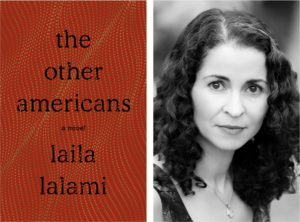 The Other Americans
The Other Americans
Laila Lalami (Pantheon)
Late one spring night in California, Driss Guerraoui—father, husband, business owner, Moroccan immigrant—is hit and killed by a speeding car. The aftermath of his death brings together a diverse cast of characters: Guerraoui’s daughter Nora, a jazz composer returning to the small town in the Mojave she thought she’d left for good; her mother, Maryam, who still pines for her life in the old country; Efraín, an undocumented witness whose fear of deportation prevents him from coming forward; Jeremy, an old friend of Nora’s and an Iraqi War veteran; Coleman, a detective who is slowly discovering her son’s secrets; Anderson, a neighbor trying to reconnect with his family; and the murdered man himself.
As the characters—deeply divided by race, religion, and class—tell their stories, each in their own voice, connections among them emerge. Driss’s family confronts its secrets, a town faces its hypocrisies, and love—messy and unpredictable—is born. Timely, riveting, and unforgettable, The Other Americans is at once a family saga, a murder mystery, and a love story informed by the treacherous fault lines of American culture.
Laila Lalami was born in Rabat and educated in Morocco, Great Britain, and the United States. She is the author of four novels, including The Moor’s Account, which won the American Book Award, the Arab American Book Award, and the Hurston/Wright Legacy Award and was a finalist for the Pulitzer Prize. Her most recent work, The Other Americans, was a finalist for the National Book Award. Her essays have appeared in the Los Angeles Times, The Washington Post, The Nation, Harper’s, The Guardian, and The New York Times. Lalami is a professor of creative writing at the University of California at Riverside. She lives in Los Angeles.
The Evelyn Shakir Non-Fiction Award
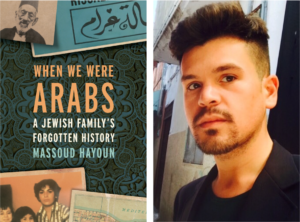 When We Were Arabs: A Jewish Family’s Forgotten History
When We Were Arabs: A Jewish Family’s Forgotten History
Massoud Hayoun (The New Press)
There was a time when being an “Arab” didn’t mean you were necessarily Muslim. It was a time when Oscar Hayoun, a Jewish Arab, strode along the Nile in a fashionable suit, long before he and his father arrived at the port of Haifa to join the Zionist state only to find themselves hosed down with DDT and then left unemployed on the margins of society. In that time, Arabness was a mark of cosmopolitanism, of intellectualism. Today, in the age of the Likud and ISIS, Oscar’s son, the Jewish Arab journalist Massoud Hayoun whom Oscar raised in Los Angeles, finds his voice by telling his family’s story.
To reclaim a worldly, nuanced Arab identity is, for Hayoun, part of the larger project to recall a time before ethnic identity was mangled for political ends. It is also a journey deep into a lost age of sophisticated innocence in the Arab world; an age that is now nearly lost.
When We Were Arabs showcases the gorgeous prose of the Eppy Award–winning writer Massoud Hayoun, bringing the worlds of his grandparents alive, vividly shattering our contemporary understanding of what makes an Arab, what makes a Jew, and how we draw the lines over which we do battle.
Massoud Hayoun is a journalist based in Los Angeles, most recently freelancing for Al Jazeera English and Anthony Bourdain’s Parts Unknown online while writing a weekly column on foreign affairs for Pacific Standard. He previously worked as a reporter for Al Jazeera America, The Atlantic, Agence France-Presse, and the South China Morning Post and has been published widely. He speaks and works in five languages and won a 2015 EPPY Award. The author of When We Were Arabs: A Jewish Family’s Forgotten History (The New Press), he lives in Los Angeles.
The Evelyn Shakir Non-Fiction Award
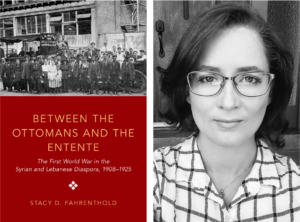 Between the Ottomans and the Entente: The First World War in the Syrian and Lebanese Diaspora, 1908-1925
Between the Ottomans and the Entente: The First World War in the Syrian and Lebanese Diaspora, 1908-1925
Stacy D. Fahrenthold (Oxford University Press)
Since 2011 over 5.6 million Syrians have fled to Turkey, Lebanon, Jordan, and beyond, and another 6.6 million are internally displaced. The contemporary flight of Syrian refugees comes one century after the region's formative experience with massive upheaval, displacement, and geopolitical intervention: the First World War.
In this book, Stacy Fahrenthold examines the politics of Syrian and Lebanese migration around the period of the First World War. Some half million Arab migrants, nearly all still subjects of the Ottoman Empire, lived in a diaspora concentrated in Brazil, Argentina, and the United States. They faced new demands for their political loyalty from Istanbul, which commanded them to resist European colonialism. From the Western hemisphere, Syrian migrants grappled with political suspicion, travel restriction, and outward displays of support for the war against the Ottomans. From these diasporic communities, Syrians used their ethnic associations, commercial networks, and global press to oppose Ottoman rule, collaborating with the Entente powers because they believed this war work would bolster the cause of Syria's liberation. Between the Ottomans and the Entente shows how these communities in North and South America became a geopolitical frontier between the Young Turk Revolution and the early French Mandate. It examines how empires at war-from the Ottomans to the French-embraced and claimed Syrian migrants as part of the state-building process in the Middle East. In doing so, they transformed this diaspora into an epicenter for Arab nationalist politics.
Drawing on transnational sources from migrant activists, this wide-ranging work reveals the degree to which Ottoman migrants "became Syrians" while abroad and brought their politics home to the post-Ottoman Middle East.
Stacy D. Fahrenthold is assistant professor of migration history at the University of California Davis, where she is also affiliated with the Global Migration Center. She is co-editor of the new book series Refugees and Migrants within the Middle East at the American University of Cairo Press. She tweets at @sdfahrenthold.
The George Ellenbogen Poetry Award
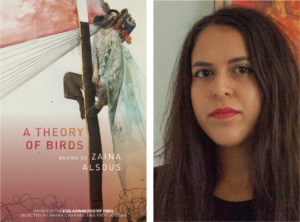 A Theory of Birds
A Theory of Birds
Zaina Alsous (University of Arkansas)
Inside the dodo bird is a forest, Inside the forest
a peach analog, Inside the peach analog a woman, Inside
the woman a lake of funerals
This layering of bird, woman, place, technology, and ceremony, which begins this first full-length collection by Zaina Alsous, mirrors the layering of insights that marks the collection as a whole. The poems in A Theory of Birds draw on inherited memory, historical record, critical theory, alternative geographies, and sharp observation. In them, birds—particularly extinct species—become metaphor for the violences perpetrated on othered bodies under the colonial gaze.
Putting ecological preservation in conversation with Arab racial formation, state vernacular with the chatter of birds, Alsous explores how categorization can be a tool for detachment, domination, and erasure. Stretching their wings toward de-erasure, these poems—their subjects and their logics—refuse to stay put within a single category. This is poetry in support of a decolonized mind.
Zaina Alsous is an abolitionist and a daughter of the Palestinian diaspora.
Children/Young Adult
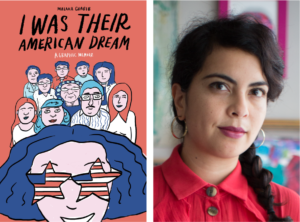 I Was Their American Dream: A Graphic Memoir
I Was Their American Dream: A Graphic Memoir
Malaka Gharib [Author and Illustrator] (Clarkson Potter)
I Was Their American Dream is at once a coming-of-age story and a reminder of the thousands of immigrants who come to America in search for a better life for themselves and their children. The daughter of parents with unfulfilled dreams themselves, Malaka navigated her childhood chasing her parents’ ideals, learning to code-switch between her family’s Filipino and Egyptian customs, adapting to white culture to fit in, crushing on skater boys, and trying to understand the tension between holding onto cultural values and trying to be an all-American kid.
Malaka Gharib’s triumphant graphic memoir brings to life her teenage antics and illuminates earnest questions about identity and culture, while providing thoughtful insight into the lives of modern immigrants and the generation of millennial children they raised. Malaka’s story is a heartfelt tribute to the American immigrants who have invested their future in the promise of the American dream.
Malaka Gharib is an artist, journalist, and writer based in Washington, D.C. She is the founder of The Runcible Spoon, a food zine, and the co-founder of the D.C. Art Book Fair. She lives in a row house with her husband Darren and her 9-year-old rice cooker.
HONORABLE MENTIONS
Fiction
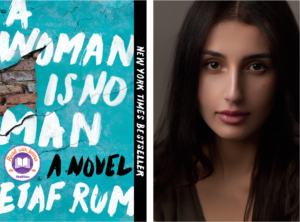 A Woman is No Man
A Woman is No Man
Etaf Rum (Harper / HarperCollins)
In her debut novel Etaf Rum tells the story of three generations of Palestinian-American women struggling to express their individual desires within the confines of their Arab culture in the wake of shocking intimate violence in their community—a story of culture and honor, secrets and betrayals, love and violence. Set in an America at once foreign to many and staggeringly close at hand, A Woman Is No Man is an intimate glimpse into a controlling and closed cultural world, and a universal tale about family and the ways silence and shame can destroy those we have sworn to protect.
Etaf Rum was born and raised in Brooklyn, New York, by Palestinian immigrants. She lives in North Carolina with her two children. Rum also runs the Instagram account @booksandbeans. A Woman Is No Man is her first novel.
Non-Fiction
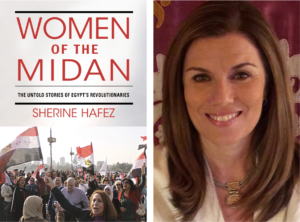 Women of the Midan: The Untold Stories of Egypt's Revolutionaries
Women of the Midan: The Untold Stories of Egypt's Revolutionaries
Sherine Hafez (Indiana University Press)
In Women of the Midan, Sherine Hafez demonstrates how women were a central part of revolutionary process of the Arab Spring. Women not only protested in the streets of Cairo, they demanded democracy, social justice, and renegotiation of a variety of sociocultural structures that repressed and disciplined them. Women's resistance to state control, Islamism, neoliberal market changes, the military establishment, and patriarchal systems forged new paths of dissent and transformation. Through firsthand accounts of women who participated in the revolution, Hafez illustrates how the gendered body signifies collective action and the revolutionary narrative. Using the concept of rememory, Hafez shows how the body is inseparably linked to the trauma of the revolutionary struggle. While delving into the complex weave of public space, government control, masculinity, and religious and cultural norms, Hafez sheds light on women's relationship to the state in the Arab world today and how the state, in turn, shapes individuals and marks gendered bodies.
Sherine Hafez is Associate Professor of Gender and Sexuality Studies at the University of California, Riverside. She is author of An Islam of Her Own: Reconsidering Religion and Secularism in Women's Islamic Movements and editor (with Susan Slyomovics) of Anthropology of the Middle East and North Africa: Into the New Millennium.
Poetry
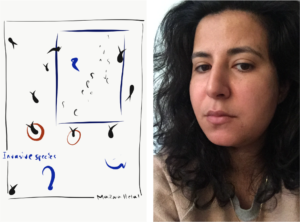 Invasive species
Invasive species
Marwa Helal (Nightboat Books)
In Invasive species, Marwa Helal’s searing politically charged poems touch on our collective humanity and build new pathways for empathy, etching themselves into memory. This work centers on urgent themes in our cultural landscape, creating space for unseen victims of discriminatory foreign (read: immigration) policy: migrants, refugees—the displaced. Helal transfers lived experiences of dislocation and relocation onto the reader by obscuring borders through language.
Marwa Helal is the author of the chapbook I Am Made To Leave I Am Made To Return and winner of BOMB Magazine’s Biennial Contest. Born in Al Mansurah, Egypt, Helal currently lives in Brooklyn, New York.
Children/Young Adult
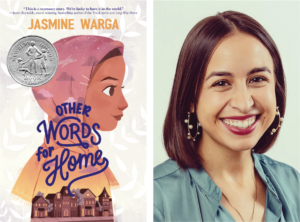 Other Words for Home
Other Words for Home
Jasmine Warga (Balzer + Brey [HarperCollins])
A gorgeously written, hopeful middle grade novel in verse about a young girl who must leave Syria to move to the United States, perfect for fans of Jason Reynolds and Aisha Saeed.
Jude never thought she’d be leaving her beloved older brother and father behind, all the way across the ocean in Syria. But when things in her hometown start becoming volatile, Jude and her mother are sent to live in Cincinnati with relatives. At first, everything in America seems too fast and too loud. The American movies that Jude has always loved haven’t quite prepared her for starting school in the US—and her new label of “Middle Eastern,” an identity she’s never known before. But this life also brings unexpected surprises—there are new friends, a whole new family, and a school musical that Jude might just try out for. Maybe America, too, is a place where Jude can be seen as she really is.
This lyrical, life-affirming story is about losing and finding home and, most importantly, finding yourself.
Jasmine Warga's debut middle grade book, Other Words for Home, is a Newbery Honor Book. She is the author of the novels for teens My Heart and Other Black Holes, which has been translated into over twenty languages, and Here We Are Now. She lives and writes in Cincinnati, Ohio. You can visit Jasmine online at www.jasminewarga.com.
